- Home
- Mitch Albom
The Next Person You Meet in Heaven Page 5
The Next Person You Meet in Heaven Read online
Page 5
Meanwhile, the rules of life had battened down. Annie was not allowed in the park alone. She was not allowed to walk in socks (lest she slip). A skateboard was deemed too dangerous, as was tree climbing and most playground equipment. Alone much of the time, Annie read her library books, wedging them into her weakened left hand and turning the pages with her right.
One morning, Lorraine took Annie to a courthouse, where they had to sign papers.
“Why?” Annie asked her mother.
“We’re changing our name.”
“I’m not Annie anymore?”
“Our last name.”
“Why?”
“It doesn’t matter.”
“Why?”
“I’ll explain later.”
“When?”
* * *
She never got an answer. Instead, months passed at the trailer park and Annie grew miserable. It was always hot in Arizona and the people in the park were old and boring. Lorraine did not talk to the neighbors. She told Annie not to, either. At night, Annie heard her mother crying in her bedroom. It made Annie angry.
I’m the one who got hurt, she thought.
This was the start of a silent resentment. It made Annie feel more alone, which only increased her bitterness. The more Lorraine cried, the less Annie could think of to say to her.
For a while, the two of them barely spoke. Emboldened by her anger, Annie began defying the rules, slipping out when Lorraine was gone. She had read in a library book that you could grow new flowers by planting a leaf off an old one. So Annie snuck scissors under her T-shirt and snipped leaves from a neighbor’s garden. She put them in small holes and poured Dixie cups of water over the top of them. She did this for weeks, looking for any sign of life. If she heard a car approaching, she would duck back into the trailer.
But one afternoon, she moved too slowly. Her mother, coming home from work, saw Annie pulling the trailer door shut.
The next day, it was locked from the outside.
Things went on this way. One night, while eating in the trailer’s tiny kitchen, it was so quiet, Annie could hear Lorraine’s chewing.
“Am I ever going to school?” Annie asked.
“Not for a little while.”
“How come?”
“I have to figure out work.”
“But I don’t know anyone here.”
“I know.”
“When are we going home?”
“We’re not.”
“Why? I don’t have any friends! I want to go home!”
Annie’s mother swallowed and rose silently. She scraped her plate into the sink. Then she walked to the bedroom, just a few feet away, and shut the door.
The next morning, she woke Annie early and made scrambled eggs with shredded cheese. She pushed them onto Annie’s plate without comment. When Annie finished, Lorraine announced, “We’re going for a ride.”
It was raining lightly, and Annie kept her arms crossed the entire trip, her mouth in a scowl. Eventually, the car pulled in to a dirt parking lot, with a one-story building and a blue-and-white sign that read PETUMAH COUNTY ANIMAL RESCUE SHELTER.
They walked towards the back. Annie heard barking. Her eyes widened.
“Are we getting a dog?” she asked.
Her mother stopped. Her face seemed to crumble. She bit her lip and blinked back tears.
“What’s the matter, Mommy?” Annie asked.
“You’re smiling,” her mother said.
* * *
That day, Annie walked past dozens of rescued or abandoned dogs. She watched them leap and paw at the cage doors. The woman running the shelter said Annie could choose any dog she wanted, so Annie studied them carefully. She played with several, letting them lick her cheeks and fingers. At the end of a row, she saw a cage with three cocoa-and-white puppies. Two ran for the door, barking on their hind legs. The third remained in the back. It wore a plastic funnel around its neck.
“What’s that?” Annie asked.
“An Elizabethan collar,” the woman said. “To keep the dog from biting or licking.”
“Biting or licking what?” Lorraine asked.
“Her wound. She needed surgery when we found her.” The woman jangled her keys. “A tough story.”
Lorraine touched Annie’s shoulder. “Come on, sweetie, there’s others to look at.”
But Annie was fixated. She felt something for this creature, wounded as Annie was wounded. She tilted her head the way the dog’s head was tilted. She made small kissing sounds. The dog stepped forward.
“Do you want to play with her?” the woman asked.
Annie’s mother shot her an annoyed look, but the woman opened the cage door.
“Come here, Cleo,” she said. “Someone wants to meet you.”
* * *
As Annie recounted this story to the old woman, the image appeared before them. The shelter owner had long, silver-tinged hair and wore blue jeans, black sneakers, and a faded flannel shirt. She smiled as she handed the collared dog to Annie.
“Is that you?” Annie asked.
“Yes,” the old woman said.
Annie looked around.
“Where’s my mother? She brought me here.”
“This is your heaven, Annie, and where it intersects with mine. Others are not included.”
That made Annie hesitate. She braced herself.
“Did I do something to you?”
“Well, yes.”
“Am I here to make amends?”
“Amends?”
“For my mistake. Whatever it was.”
“Why do you assume it was a mistake?”
Annie didn’t say what she was thinking: that her whole life, she’d been making mistakes.
“Tell me about Cleo,” the old woman said.
* * *
The truth was, for nearly a year, Cleo, part beagle, part Boston terrier, was Annie’s primary companion. Lorraine could only find part-time work, morning shifts at an auto-parts factory; she was gone by the time Annie woke up and didn’t return until the afternoon. Annie hated having to call her mother every morning and tell her that she’d eaten breakfast. She especially hated hanging up and being alone. With Cleo, there was finally another presence in the trailer—a furry, foot-tall presence, with floppy brown ears and a mouth that curled like a smile beneath her muzzle.
That first day after the shelter visit, Annie poured a bowl of cereal for herself and a bowl of pellets for her new dog. She watched Cleo try to eat with the awkward collar. The surgery wound near her shoulder was still red. How did that happen? Annie wondered. Did she run into something sharp? Did another dog attack her?
Cleo whined as the collar blocked her access. Annie was not supposed to take it off; her mother had told her six times. But the dog looked at Annie as if begging for help, and Annie felt so bad that she leaned over and, with her good hand, undid the clasp. Cleo surged to the bowl.
When all the pellets were eaten, Annie tapped her thighs, and Cleo scrambled her way. She crawled into Annie’s lap and sniffed her splinted fingers. Even when redirected, the dog returned to Annie’s injury, licking and poking it with her muzzle.
“You want to see?” Annie said. She took her arm out of the sling. Cleo licked the skin around her wrist and whimpered. Something stirred inside Annie, as if the dog understood more than a dog should.
“It still hurts,” Annie whispered. “And I don’t even know what I did.”
She realized she was crying. Perhaps because she had said the words out loud. I don’t even know what I did. The more Annie cried, the more the dog whined with her, lifting its snout to lick the tears away.
“Did you know,” the old woman said now, standing beside the grown-up Annie, “that a dog will go to a crying human before a smiling one? Dogs get sad when people around them get sad. They’re created that way. It’s called empathy.
“Humans have it, too. But it gets blocked by other things—ego, self-pity, thinking your own pain must be tended to fir
st. Dogs don’t have those issues.”
Annie watched her younger self rub her cheek against Cleo’s snout.
“I was so lonely,” Annie whispered.
“I could tell.”
“I lost everything I knew.”
“I’m sorry.”
“Did you ever feel that way?”
The woman nodded. “Once.”
“When?” Annie asked.
The woman pointed to the trailer window.
* * *
Annie stepped up. She did not see the outside. Instead, through the glass, she viewed a darkened room in an abandoned house. There was no furniture. A window was smashed. Graffiti was sprayed on the rear wall. In the corner, Annie saw a pair of eyes, barely catching the light. Annie realized it was a large mother dog, lying on the dirty floor, surrounded by puppies nuzzling her belly.
“She gave birth a week earlier,” the old woman said.
“Why is she in this house?”
Before the old woman could answer, the door burst open, and two men in T-shirts, jeans, and boots, one wearing a ski hat, stumbled inside, holding cans of beer. They recoiled when they heard the growl of the mother dog.
The man in the ski hat went wobbly for a moment. Then he pulled a gun from the rear of his pants.
“No . . .” Annie whispered.
The man fired three times, each bullet creating a small burst of orange light. The men laughed. They swigged from their cans, then fired again. After five more shots, they staggered out the door.
“What happened?” Annie said. “What just happened?”
The old woman looked away. Annie heard muffled laughter coming from outside, and whining, high-pitched squeals from the corner. She saw the puppies pawing at their now lifeless mother. Tears rolled down Annie’s face.
“They killed her?”
“And some of her babies,” the old woman said. “Three survived.”
“The poor mother.”
“Yes. That was the last time I saw her.”
Annie blinked. “What did you say?”
The woman pulled back the collar of her coat and leaned forward to reveal an old gunshot wound on her shoulder. She touched Annie’s teary cheeks.
“I cried for you. You cry for me.”
Annie Makes a Mistake
She pulls a T-shirt over her head and clips a leash on Cleo.
“Let’s go, girl.”
It is eight months since the accident. Annie’s bandages are gone. So is Cleo’s plastic collar. New fur has grown around Cleo’s wound. But Annie’s hand is rippled with red scars and discolored by uneven circulation. The fingers often curl involuntarily, making it look like a claw. Annie wishes she could grow fur on top of her scars like Cleo had.
“Now stay with me,” Annie says, mounting her bicycle. “Don’t go running ahead.”
She is not supposed to ride without her mother. She is not supposed to take Cleo beyond the trailer park. But being alone has made her resourceful. And there is something she wants to see.
“Come on, girl. Here we go . . .”
As she pedals, the dog romps alongside, and she steers mostly one-handed, a skill she has developed. They cut through a small wooded area, down a street, and beyond some hedges. Annie stops and sets her bike on its kickstand. She walks down a hill, Cleo beside her. They reach a fence and Annie hooks her fingers into the links.
In front of her is a school. Recess is about to start. Annie knows this. She has been here before.
A bell rings and children spill out the doors. They scatter around swing sets. Some kick a ball. Their voices are loud and happy-sounding. Annie crouches lower. She spots two girls who look her age wandering off to the side of the building. One has straight blond hair and is wearing black jeans and pink sneakers. Annie wishes she had pink sneakers.
“Stay here,” Annie whispers. She wraps Cleo’s leash around the fence. Cleo whines, but Annie says, “Shhh!” and tiptoes off.
She passes along the perimeter of the fence. She goes around a bend where the ground is new mulch, wet from a sprinkler. She sees the two girls now, leaning against the school wall. One takes something from her pocket and applies it to the other’s mouth. Lipstick? Curious, Annie climbs atop a tree stump for a better view. The girls are gazing into something and making faces—a mirror, maybe?—and Annie wonders what color lipstick it is.
Suddenly, the girls turn her way and Annie loses her balance. She falls and lands on her bad hand, a jolt of pain shooting through her. She bites her lower lip. Wet mulch sticks to her arms. She doesn’t move, fearful the girls might approach.
Finally, the bell rings and the voices disappear. Annie rises slowly, her wrist throbbing, and trudges back to where she left Cleo.
When she gets there, the dog is gone.
Her heart begins to race. “Cleo?” she yells. “Cleo?”
She runs the length of the fence. Nothing. She runs back. Nothing. She runs up the hill to her bicycle. Nothing. She spends the next hour circling the same streets, tears burning her eyes, yelling Cleo’s name and praying she’ll hear barking in return.
Finally, knowing her mother will be back soon, she pedals home, sobbing. When she reaches the trailer, she stops. She exhales. There, sitting against the door, is Cleo, her leash trailing like a leather snake.
“Oh, Cleo, come here!” Annie says as the dog races to her, leaping into her grasp and licking the mulch on her arms. This is better, Annie thinks, a dog who loves me, a dog who’s happy to see me, better than those girls and their stupid lipstick, better any day of the week.
The Second Lesson
Annie stared at the old woman in the coat.
“Are you saying . . . ?”
“I’m Cleo.”
“But you’re a woman.”
“I thought this form would be easier.”
“The shelter owner. I asked if that was you—”
“She was holding me. You asked if ‘that’ was me. Or I thought that’s what you asked. Sorry. We often think things are about us when they are not.”
Annie studied the woman’s sagging skin, the sloped nose, the gaps between her teeth.
“Cleo,” she whispered.
“Yes.”
“We’re communicating.”
“We always communicated. Didn’t you know when I was hungry? When I was scared? When I wanted out?”
“I guess,” Annie said. “And you? You understood when I spoke to you?”
“Not your words. But your intent. Dogs hear differently than humans; we detect emotion in your voices. Anger, fear, lightness, heaviness—I could tell those from your sound. I could smell your day on your skin. What you ate. When you’d showered. The times when you sprayed your mother’s perfume on your wrists. Remember? You would sneak into her room and sit by her mirror and hold your hand out for me to sniff?”
Annie stared hard into Cleo’s eyes, trying to imagine the rest of her, her cocoa fur, her thin, floppy ears. She recalled the things Cleo recalled. She recalled Cleo getting older. She even recalled the day Cleo died, driving to the vet’s office in her mother’s car, a sluggish Cleo breathing slowly in her lap. But she did not know how these memories could matter now.
“Why are you here, Cleo?” Annie asked.
“To teach you something. Each soul you meet in heaven does the same.”
“So animals have souls?”
Cleo looked surprised.
“Why wouldn’t they?” she said.
* * *
The landscape suddenly shifted. They were out of the trailer, away from the abandoned house. They were floating now in a pale green sky, atop what appeared to be a massive mattress, with orange sheets and pink pillows that looked like small hills.
“Wait,” Annie said. “This is my old bed . . .”
“That’s right.”
“It’s huge.”
“Well, that’s how it looked to me. I had to run and leap when you called me.”
“Why are you—”
“
Loneliness, Annie. That’s what I am here to explain. You suffered it. You tortured yourself over it. But you never understood it.”
“What’s to understand about being lonely?” Annie snapped. “It’s terrible.”
“Not always. Do you think, if you hadn’t felt so lonely, you would have chosen me at the shelter? Or taken off my collar to let me eat that first morning? Your loneliness gave me a home. And happiness.
“Remember what I said about empathy? It works both ways. I was wounded. Different. And you felt . . .”
Annie glanced at her detached left hand.
“Wounded,” she whispered. “Different.”
“And . . . ?”
“Alone.”
The woman nodded towards the giant pillows, and Annie saw a thousand nights of her childhood, cradling her beloved companion.
“Not alone,” Cleo said.
* * *
The landscape changed once more, back to the checkerboard lawns Annie had seen earlier and the countless dogs waiting patiently by the doors.
“Have you ever considered how many living things there are on earth?” Cleo asked. “People. Animals. Birds. Fish. Trees. It makes you wonder how anyone could feel lonely. Yet humans do. It’s a shame.”
She looked to the sky, now a deep shade of purple. “We fear loneliness, Annie, but loneliness itself does not exist. It has no form. It is merely a shadow that falls over us. And just as shadows die when light changes, that sad feeling can depart once we see the truth.”
“What’s the truth?” Annie asked.
“That the end of loneliness is when someone needs you.” The old woman smiled. “And the world is so full of need.”
* * *
With that, all the doors on all the lawns swung open, revealing countless grim-faced people, children on crutches, adults in wheelchairs, soldiers in dirt-stained uniforms, widowed women in veils. Annie sensed they were all in need of comfort in some way. The dogs sprang to them, tails wagging. They licked and nuzzled the sad people and were embraced and cradled in return. The grim faces melted into grateful smiles.

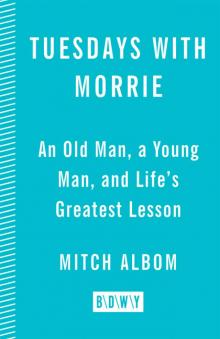 Tuesdays With Morrie
Tuesdays With Morrie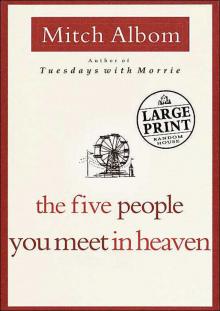 The Five People You Meet in Heaven
The Five People You Meet in Heaven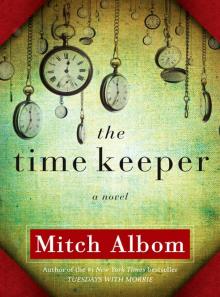 The Time Keeper
The Time Keeper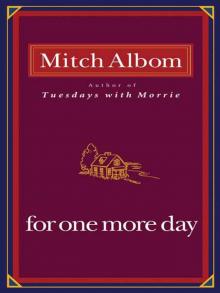 For One More Day
For One More Day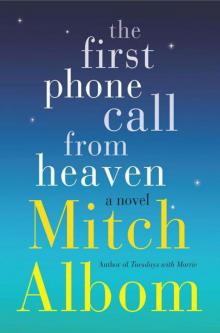 The First Phone Call From Heaven: A Novel
The First Phone Call From Heaven: A Novel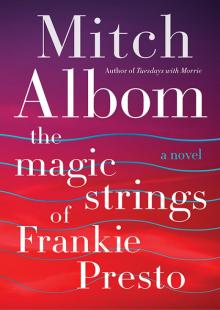 The Magic Strings of Frankie Presto
The Magic Strings of Frankie Presto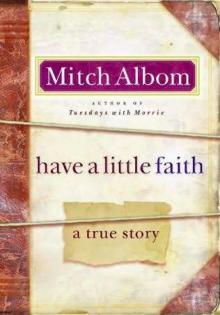 Have a Little Faith: A True Story
Have a Little Faith: A True Story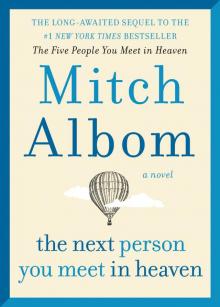 The Next Person You Meet in Heaven
The Next Person You Meet in Heaven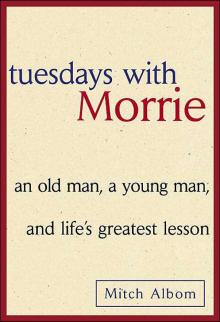 Tuesdays with Morrie: an old man, a young man, and life’s greatest lesson
Tuesdays with Morrie: an old man, a young man, and life’s greatest lesson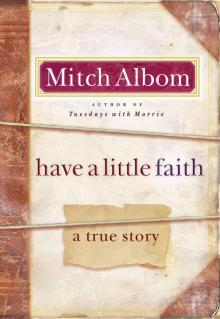 Have a Little Faith
Have a Little Faith